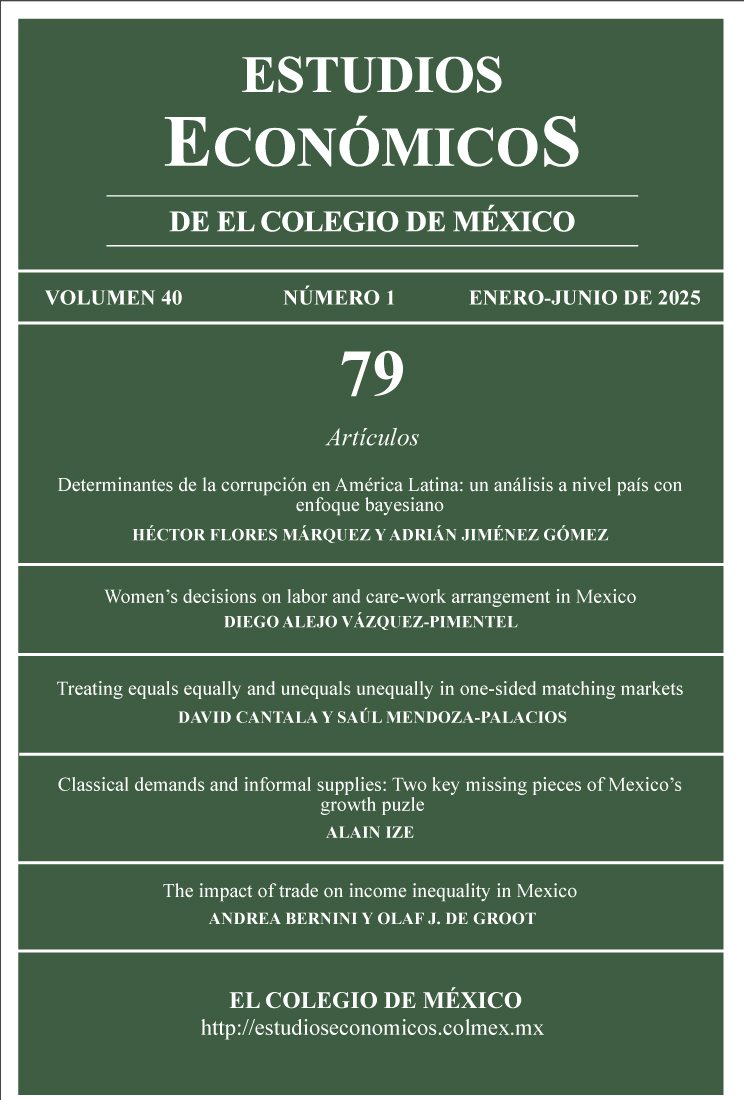Artículos

Publicado 2025-03-26
Palabras clave
- emparejamiento unilateral,
- teoría del transporte óptimo,
- optimalidad de Pareto
Cómo citar
Cantala, D., & Mendoza-Palacios, S. (2025). Trato diferenciado por tipo en mercados de asignación unilaterales. Estudios Económicos De El Colegio De México, 40(1), 1–12. https://doi.org/10.24201/ee.v40i1.e461
Resumen
En el mercado de asignación unilateral de Shapley y Scarf (1974) introducimos el axioma de “trato diferenciado por tipo” (TEEUU, por sus siglas en inglés). Modelamos el mercado de asignación como una función medible que asigna a cada tipo de agente un tipo de bien. Establecemos: 1) un método, fundamentado en la literatura de transporte óptimo, que permite encontrar una asignación en el núcleo que cumpla con el axioma TEEUU siempre que exista - el método consiste en buscar una asignación Pareto óptima. 2) Condiciones que garantizan la existencia de una asignación en el núcleo que cumpla con TEEUU.
Descargas
Los datos de descargas todavía no están disponibles.
Citas
- Abdulkadiroğlu, A. and T. Sönmez. 2003, School choice: A mechanism design approach, American Economic Review, 93(3): 729-747. DOI: https://doi.org/10.1257/000282803322157061
- Aumannn, R.J. 1964, Trading with a continuum of players, Econometrica, 32(1-2): 39-50. DOI: https://doi.org/10.2307/1913732
- Bridges, D.S. and G.B. Mehta. 2013. Representations of Preferences Orderings, Vol. 422, Springer.
- Carlier, G. 2003. Duality and existence for a class of mass transportation problems and economic applications, in S. Kusuoka and T. Maruyama (eds.), Advances in Mathematical Economics, Vol. 5, Springer. DOI: https://doi.org/10.1007/978-4-431-53979-7_1
- Debreu, G. 1954. Representation of a preference ordering by a numerical function, in M. Thrall, R.C. Davis, and C.H. Coombs (eds.), Decision Processes, New York, John Wiley and Sons.
- Echenique, F., N. Immorlica, and V. Vazirani. 2023. Online and Matching-Based Market Design, Cambridge University Press.
- Garg, J., T. Tröbust, and V. V. Vazirani. 2021. One-sided matching markets with endowments: equilibria and algorithms, Autonomous Agents and Multi-Agent Systems, 38: 40. DOI: https://doi.org/10.1007/s10458-024-09670-9
- Gretsky, N.E., J.M. Ostroy, and W.R. Zame. 1992. The nonatomic assignment model, Economic Theory, 2(1): 103-127. DOI: https://doi.org/10.1007/BF01213255
- Kaneko, M. and M.H. Wooders. 1986. The core of a game with a continuum of players and finite coalitions: The model and some results, Mathematical Social Science, 12(2): 105-137. DOI: https://doi.org/10.1016/0165-4896(86)90032-6
- Koopmans, T.C. and M. Beckmann. 1957. Assignment problems and the location of economic activities, Econometrica, 25(1): 53-76. DOI: https://doi.org/10.2307/1907742
- Kovalenkov, A. and M. Wooders. 2003. Aproximate cores of games and economies with clubs, Journal of Economic Theory, 110(1): 87-120. DOI: https://doi.org/10.1016/S0022-0531(03)00003-6
- Levin, V.L. 1983. A continuous utility theorem for closed preorders on a -compact metrizable space, Doklady Akademii Nauk, 28(3): 715-718.
- Levin, V.L. 2004. Optimal solutions of the Monge problem, in S. Kusuoka and T. Maruyama (eds.), Advances in Mathematical Economics, Vol. 6, Springer. DOI: https://doi.org/10.1007/978-4-431-68450-3_5
- Rachev, S.T. and L. Rüschendorf. 1998. Mass Transportation Problems. Volume I: Theory, Springer.
- Shapley, L. and H. Scarf. 1974. On cores and indivisibility, Journal of Mathematical Economics, 1(1): 23-37. DOI: https://doi.org/10.1016/0304-4068(74)90033-0

